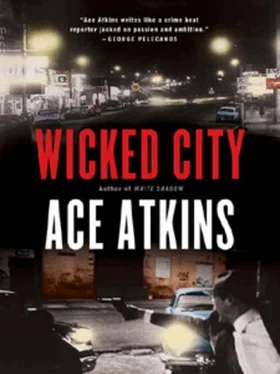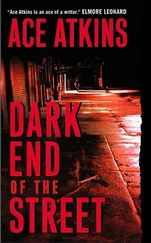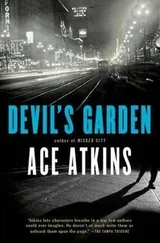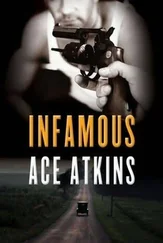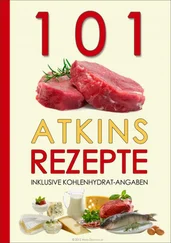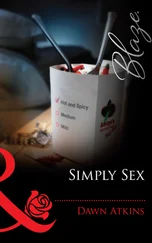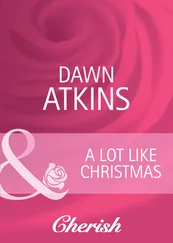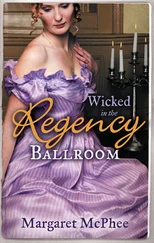“You okay?”
“Yeah, I’m fine.”
I waited. Joyce walked out the back door and asked us if we wanted some more coffee, and we both thanked her as she walked back inside, drying her hands on a dish towel.
“Me and this boy from Erie, Pennsylvania, named Wurst, were good buddies. Been through battle and blood and all that bullshit. About the same age. Too stupid to know what we’d gotten ourselves into but now wanting to live it up. Every day feeling like a goddamn gift.”
He stood up, his feet unsteady.
“We were horny as goats and took our pay on a Friday night over to Phenix City.”
He lit a cigar, one that had already been smoked halfway, and told me the story. They’d come over the river in ’46 and met some girl at Clyde Yarborough’s Café, before he’d opened the Atomic Bomb.
“But this girl, they called her Barbara LeMay, wasn’t a girl at all. Turned out her name was really Ed, and he had a pecker bigger than a horse. My buddy started to raise some hell with Yarborough and Yarborough threatened him. When I stepped up, that mush-mouthed freak about split my skull with the butt of a 12-gauge. It all ended up in a slugfest with Yarborough and this other hood. This boy had a hell of a punch, but we just about had ’em when Yarborough shot Wurst in the head and me in the chest.”
Black loosened his tie and pulled down the collar of his dress shirt, showing a patchwork of skin grafts and scars across his upper chest.
“What about Wurst?”
Black shook his head. “They tossed us both into the river.” He paused a moment. “I made it out.”
“And Ferrell never prosecuted, of course.”
“He called it abnormal behavior to solicit a man. You know the Army came over and did an investigation? They never did find Wurst’s body. I was in the hospital for about six months.”
I could see only the glowing red tip of the cigar, smelling the tobacco mix with the fall leaves smoldering up into the white of the moon.
“You know the other man with Yarborough?”
He nodded.
“It was your friend Reuben.”
“You sure?”
“You don’t forget a night like that, boss. You watch out for him. He’s the same as the rest of ’em.”
REUBEN SAT AT THE BEATEN KITCHEN TABLE CLEANING A gun with a dirty red rag, the potbellied stove giving off a dull, warm heat. And it felt good, as he sat in his union suit, unshaven, cleaning and working the cylinders in a little.22 pistol that he hadn’t owned but two hours. He had some of Moon’s fresh ’shine in a jelly jar, and he’d already smoked the last of the cigarettes he’d gotten in jail. He felt hollow, and his hands shook as he loaded in the little skinny bullets, and he took another drink just as Billy walked in and saw two T-bone steaks thawing on the counter, a couple of baked potatoes already in the stove.
“You all right?” he asked.
“I’m fine.”
“I’m goin’ out.”
“Ain’t you got school?”
“What’s that got to do with anything?”
“What you seein’?”
“Hmm?”
“What you seein’? I figured you goin’ to see a movie.”
“I’m goin’ to shoot some pool.”
“You need to stay out of those pool halls. Ain’t nothin’ in them but trouble. They’ll pick your pocket dry.”
Reuben stood and wavered for a moment, and he thought about the stories he’d heard about Moon’s special ’shine and how he’d used formaldehyde and embalming fluid to give that corn liquor a special kick. A few years ago, a damn raccoon had been tempted by that sweet mash and crawled in the still, only to become part of the ’shine himself.
“You can’t even stand up.”
“Hell you say. I’m just hungry. Go ahead and put them steaks on the skillet. I got some sauce, too. Some of that A.1. you like from over at Mr. Hoyt’s place.”
Billy just stood there staring at him, his skinny arms crossed over his body. And there was something different about him, a little shadow above his lip, some grease in his hair.
“You look like a damn punk,” Reuben said.
“I learn from the best.”
“I didn’t have a thing to do with that whore. Don’t you go blaming me on that.”
“Those are your people, aren’t they? Johnnie and Bert Fuller. That fat-ass moonshiner. They’re all your buddies.”
“They didn’t have anything to do with it either.”
Reuben breathed, tried to catch an air of dignity, righting his shoulders, and then crossing over to set the black iron skillet he got from his mama on the stove, putting those T-bones on in with a hiss. He didn’t say anything, just tried to keep his eyes open, that ’shine filling his veins and making him feel hot. When the steaks got nice and pink, not frozen but good and bloody, he cracked some eggs next to them and the whole thing smelled so good he almost forgot about Billy.
But Billy was still there, the little Emerson radio in the kitchen catching “Louisiana Hayride” with Hank Snow, and Reuben’s mind coming back to having that pride of driving ole Hank Williams around and how, even though he wasn’t a hero, just being a part of the show made him feel alive and important.
Before he knew it, old Snow was playing that “Long Gone Lonesome Blues.” And Reuben sang along with it, his mind back on Shreveport on a hot summer night where girls in white cotton dresses and suntans smelled like flowers just picked off a thorny bush.
“Why’d he fire you?”
“Who?”
“Hank Williams.”
“He didn’t fire me. Hell, he died.”
Reuben stuck a fork in the steak and flipped it and a hard-fried egg – more hard than he liked it – up on a plate and set it before Billy, asking him if he wanted some of those Mexican beans that his mama liked.
“No, sir.”
“No, sir? A steak dinner sure can get some respect in this house.”
“Whose gun is that?”
“Mine.”
“Not one I ever seen.”
“I got a lot of guns.”
“Thought the Guard took most of them.”
“The ones they could find.”
“What’re you gonna do with that one?”
“Would you just eat your supper and go on?”
They ate, and the damn silence was so intense you could hear every scrape of the fork and grunted chew and labored breath. But then Reuben had to stop, and he walked over to the big farm sink and stuck his head under the pump, dousing his face with the cold water.
He took a good portion of the liquor inside of him and then walked back to his bedroom, his steak left half-eaten. The eggs not touched.
When he came back, he was dressed in blue jeans and red-and-green boots, the ones with a cactus on the shaft. He’d shaved and he’d combed his hair back with some pomade, and, with his sleepy eyes, he looked down at Billy, scooping up the gun and tucking it inside his front pocket.
“You do me a favor?”
His boy looked at him.
“Get out of this place. Get as far as you can from this farm because it will spoil your soul.”
“I like it here.”
“You ain’t too bright. And you stay away from Lamar Murphy. I know what you told him.”
Billy pushed the steak dinner away and looked up at his father and shook his head. “You are one sorry, worthless bastard.”
Reuben took a breath, wavered on his feet, and walked, every step of those big boots making his boy flinch just a little bit more. He breathed hard, keeping it in like you would a lungful from a Lucky, and he raised the back of his hand, but he shook and held it there, watching the boy duck, placing his hands over his head, waiting for it and, somehow in a strange way, seeming to want it. He wanted Reuben to beat the hell out of him.
Reuben leaned down and kissed the boy on his head, tasting the pomade and smelling the strange odor of the kid, a man’s sweat. It was all so damn unfamiliar.
Читать дальше
